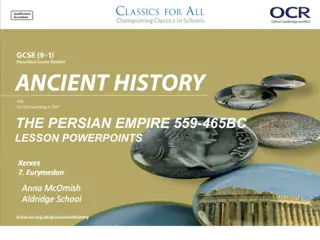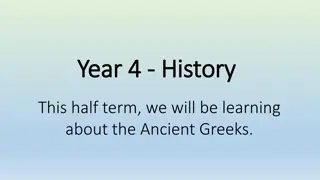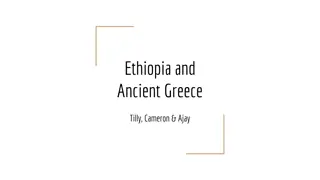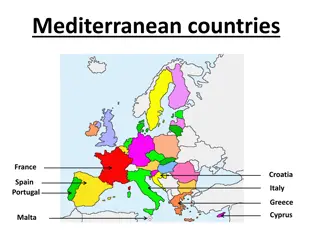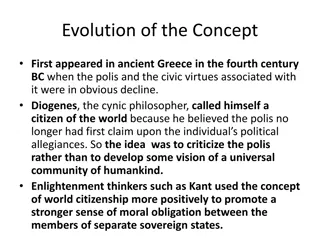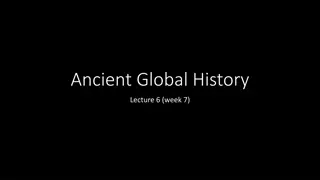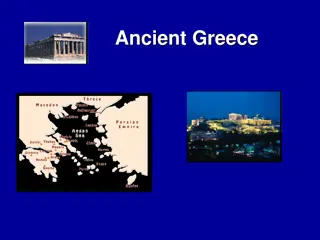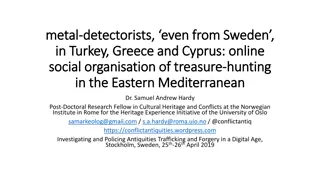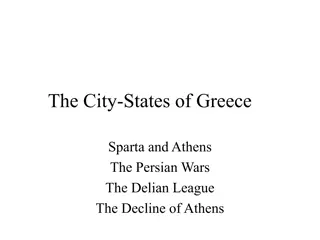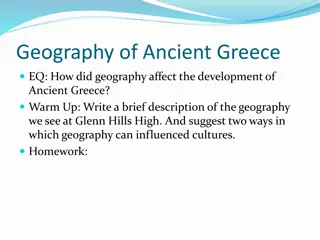
Explore the Rich History, Culture, and Beauty of Greece
Discover the wonders of Greece, officially known as the Hellenic Republic, a country abundant with history, culture, and natural beauty. From its ancient ruins to vibrant traditions, Greece has deeply influenced Western civilization. Learn about Greek culture, history spanning thousands of years, mythology, and stunning geography. Explore the essence of Greek cuisine, music, dance, festivals, and the significance of Greek mythology in shaping Western culture. Immerse yourself in the allure of this southeastern European gem and experience the magic of Greece.
Download Presentation

Please find below an Image/Link to download the presentation.
The content on the website is provided AS IS for your information and personal use only. It may not be sold, licensed, or shared on other websites without obtaining consent from the author. If you encounter any issues during the download, it is possible that the publisher has removed the file from their server.
You are allowed to download the files provided on this website for personal or commercial use, subject to the condition that they are used lawfully. All files are the property of their respective owners.
The content on the website is provided AS IS for your information and personal use only. It may not be sold, licensed, or shared on other websites without obtaining consent from the author.
E N D
Presentation Transcript
Greece, officially known as the Hellenic Republic, is a southeastern European country rich in history, culture, and natural beauty. With its stunning islands, ancient ruins, and vibrant traditions, Greece has profoundly influenced Western civilization.
GREECE CULTURE Greek culture is a blend of ancient traditions and modern influences. Key aspects include: Language: Greek is one of the oldest written languages still in use today, with its origins traced back over 3,000 years. Cuisine: Greek cuisine is Mediterranean, featuring olive oil, fresh vegetables, seafood, lamb, and dishes like moussaka, souvlaki, and baklava. Music & Dance: Traditional Greek music uses instruments like the bouzouki, and dances such as the syrtaki and kalamatianos are widely celebrated. Festivals: Cultural and religious festivals are vital, including Easter (Pascha), which is the most significant religious celebration.
GREECE HISTORY Greece has a history spanning thousands of years: 1. Ancient Greece (c. 800 BCE 146 BCE): Known as the cradle of Western civilization, Ancient Greece introduced democracy, philosophy (with thinkers like Socrates, Plato, and Aristotle), theater, and the Olympic Games. City-states like Athens and Sparta dominated this era. 2. Roman & Byzantine Periods (146 BCE 1453 CE): Greece became part of the Roman Empire and later the Byzantine Empire, playing a central role in the spread of Christianity. 3. Ottoman Rule (1453 1821): Greece was under Ottoman rule for nearly 400 years, influencing its culture and traditions. 4. Modern Greece (1821 present): Greece gained independence in 1821 after the Greek War of Independence and has since evolved into a modern European nation.
GREECE MYTHOLOGY Greek mythology is a cornerstone of Western culture, encompassing a pantheon of gods, heroes, and myths: Gods and Goddesses: The Olympian gods, such as Zeus, Hera, Poseidon, and Athena, resided on Mount Olympus and were central to Greek religion. Heroes and Legends: Myths of Hercules, Perseus, and Achilles highlight themes of heroism and morality. Creation Myths: Stories like the birth of the cosmos and the titanic struggles of the Titans offer insight into ancient Greek views of the world. Significance: Greek mythology inspired countless works of literature, art, and philosophy and continues to captivate imaginations worldwide.
GREECE GEOGRAPHY Greece is in southeastern Europe, at the southern end of the Balkan Peninsula. It is bordered by Albania, North Macedonia, Bulgaria, and Turkey, and surrounded by the Aegean, Ionian, and Mediterranean Seas. The country is mountainous, with Mount Olympus as the highest peak. Greece has many islands, including Crete, and a long, indented coastline.
GREECE CAPITAL ATHENS The city of Athens is the capital and largest city of Greece since 1834, where the city became the capital city instead of Nafplio, which was the temporary capital in 1829 after the Liberation of Greece and the Declaration of Independence.
GREEKS The Greeks, or Hellenes, are a people native to Greece, Cyprus, and regions influenced by Greek culture. Renowned for shaping Western civilization, ancient Greece contributed greatly to philosophy, art, and science, with figures like Socrates and Aristotle leaving a lasting legacy. Greek culture evolved through the Byzantine Empire, deeply tied to Orthodox Christianity, and endured centuries of Ottoman rule before Greece gained independence in the 19th century. Modern Greek culture is celebrated for its traditions, vibrant festivals, and cuisine, emphasizing family and community. The Greek diaspora continues to enrich global arts, science, and politics.
OLYMPIC GAMES Greece is the birthplace of the ancient Olympic Games, first recorded in 776 BC in Olympia, and hosted the modern Olympic Games twice, the inaugural 1896 Summer Olympics and the 2004 Summer Olympics. During the parade of nations, Greece is always called first, as the founding nation of the ancient precursor of modern Olympics. The nation has competed at every Summer Olympic Games, one of only four countries to have done so. Having won a total of 121 medals (35 gold, 45 silver and 41 bronze), Greece is ranked 33rd by gold medals in the all-time Summer Olympic medal count. Their best ever performance was in the 1896 Summer Olympics, when Greece finished second in the medal table with 10 gold medals.
Made by Miqayel Hovhannisyan 9-4 THE END



